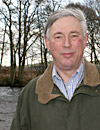(This story was first published in The Herald, 5 July 2008)
GAME angling leaders gave a warm welcome to the launch yesterday of the Scottish government’s strategic plan for the future of freshwater fishing but warned that anglers may have to pay more for their sport in future.
Announced at the opening of the Game Fair at Scone, Perthshire, the Strategic Framework for Freshwater Fisheries promises an ambitious new vision for freshwater angling on the country’s 50,000km of rivers and 31,000 lochs, including:
- Improved funding and legislation to support fishery management
- Streamlining of fishery organisations
- Catchment-based management of freshwater species
Tony Andrews, executive director of the Atlantic Salmon Trust, said: “It is absolutely essential that we manage our national fisheries in a sustainable way. This strategy is a huge step forward.

“The beauty is that fishery managers, scientists and angling bodies were not just consulted about it, they actually own the strategy themselves. It is a virtuous circle.”
But he warned that it was a work in progress and there was little prospect of direct government funding for development of the sport. “There is little doubt the punter will have to pay,” he said.
His view was echoed by Ronnie Picken, chairman of the Scottish Anglers’ National Association, which governs trout angling. He said: ” Considering the amount of income recreational angling generates for the Scottish economy, I think the government has to look kindly on the sport.
“But I think it is only right that anglers should contribute to its development and that means brown trout and coarse fishermen having to pay more.”
The introduction of rod licence fees in Scotland has been widely rejected by the angling community as unacceptable, but the Scottish Executive has been coy so far about the level of funding it intends to provide to freshwater fishing which delivers £120 million annually to the economy and supports thousands of rural jobs.
Launching the plans yesterday, rural affairs minister Richard Lochhead would not put any figure on future investment. He said: “The measures within the Framework are forward-looking and acknowledge that work needs to be undertaken before its vision can be realised.”
He said it was “hugely significant” that a group representing so many fishing interests had worked together to develop the framework and had agreed to operate it.
He added: “I hope that anglers and fishermen alike take its provisions to heart and work with the government and the river authorities to contribute to the sustainable economic growth of rural Scotland.”
The plan proposes eight projects for priority action, including education and youth coaching, fishery district amalgamation, tourist market research and promotion.